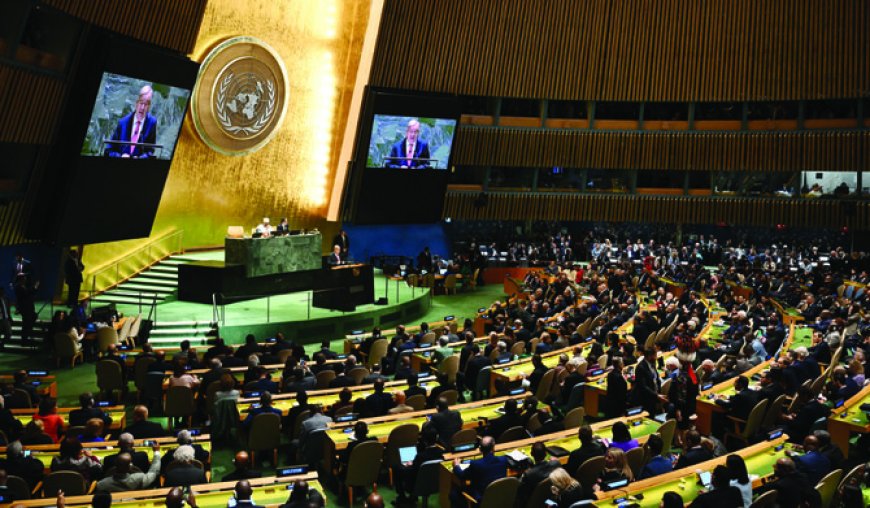Has the UN failed the Gaza test?
Many in the Middle East and beyond are progressively challenging the United Nations' capacity to follow its basic values as the war in Gaza rages on, especially with relation to its reaction to the conflict. Critics of the UN have said that it has let fear of facing the United States and Israel undermine its dedication to international law, therefore failing what they refer to as the "Gaza test." These views contend that the UN has lost legitimacy by withdrawing from its obligations.

Many in the Middle East and beyond are progressively challenging the United Nations' capacity to follow its basic values as the war in Gaza rages on, especially with relation to its reaction to the conflict. Critics of the UN have said that it has let fear of facing the United States and Israel undermine its dedication to international law, therefore failing what they refer to as the "Gaza test." These views contend that the UN has lost legitimacy by withdrawing from its obligations.
Nonetheless, UN Secretary-General Antonio Guterres fervently supports the activities of the agency, saying that "there is no fear in the UN Secretariat building to confront anybody." Speaking on the margins of the 79th UN General Assembly in New York, Guterres underlined that his position has been constant. He argues the UN has constantly supported the values of the UN Charter, international humanitarian law, and the right to self-determination of the Palestinians.
Guterres is open, though, about the constraints on UN authority. "We have no real power, let's be honest," he said, noting that the sole UN body with actual power—the Security Council—remains paralysed. Emphasising that the UN has been vociferous from the start, demanding cease-fires, humanitarian supplies, and the release of captives, Guterres moved the responsibility for the ongoing carnage to those actively fighting the war. He did, however, recognise the terrible reality that the UN cannot compel reluctant parties to answer its appeals for peace.
The Security Council is essential in UN's problems in Gaza since its dynamics mirror the post-World War II order. Reserved for the five permanent members—China, Russia, France, the UK, and the US—the veto authority sometimes prevents forceful action. Working on Security Council reform, Kuwait's permanent representative to the UN, Tarek Al-Banai, underlined the frustrating reality that a single veto-wielding member can stop even when most people supported action.
Particularly the US has been under fire for its consistent military and political support of Israel. The US has essentially stalled UN efforts to stop the bloodshed by using its veto authority four times to reject resolutions calling for cease-fires or humanitarian pauses since the start of the Gaza conflict in October 2023. The US has diminished its influence even in rare cases when resolutions have approved, including Resolution 2728. For instance, Ambassador Linda Thomas-Greenfield said the resolution was non-binding, therefore undermining the Security Council's power and supporting charges of Western double standards.
Notwithstanding these irritations, Guterres insists that the Security Council is only one element of the larger UN framework. Still playing significant roles are other UN agencies such the General Assembly, UNICEF, the World Health Organisation, and the Office for the Coordination of Humanitarian Affairs. Though their ability to halt the war is limited, these bodies have proven quite important in helping citizens. Still, Guterres voiced great sorrow about his lack of action for Gaza, where the humanitarian crisis has become disastrous and starvation threatens the besieged territory.
"There have often been a sequence of challenges, many resulting directly from the Israeli authorities as well as from local insecurity," Guterres said. He cited current polio vaccination campaigns as proof that the UN is able to act quickly and forcefully when these obstacles are eliminated. But as he underlined, the political answer to Gaza's predicament cannot be only humanitarian; it must be political.
Guterres demanded a clear road map towards a two-state solution in line with international negotiations imagining Palestinians and Israelis together in peace and security. Still, the road forward is yet unknown. Deep internal strife inside the international community, stagnation in the Security Council, and ongoing violence all point to the UN, for all its efforts, perhaps continuing to struggle in the face of one of the most difficult and protracted conflicts of the modern age.
Ultimately, even if Guterres and the UN Secretariat can deny claims of failure, the situation in Gaza reminds us sharply of the constraints the UN has, especially when strong countries exercise their influence to prevent significant action. if the Gaza conflict will long be recognised as a crucial test of the UN's capacity to enforce the fundamental laws and values it was intended to defend or if the organisation can recover its footing and restore its reputation is still to be seen.













































